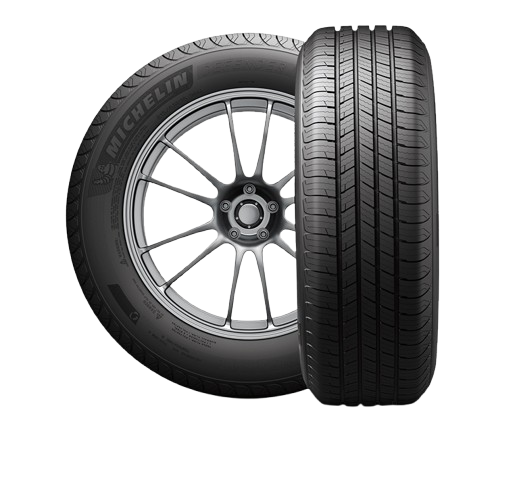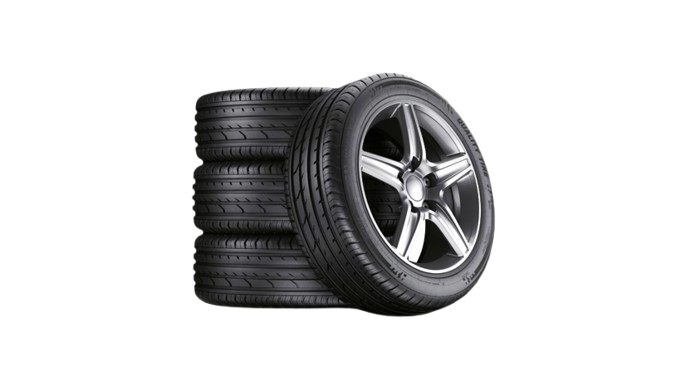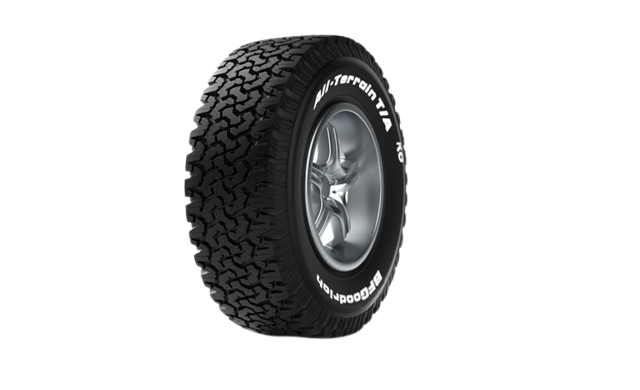To test in the dry and the wet, we headed to Tire Rack’s track in South Bend, Indiana. Built next to one of the company’s 12 warehouses containing more than a million tires, it’s also where Tire Rack tire information and testing manager TJ Campbell evaluates literally every model that Tire Rack sells.
Campbell has made a career out of mulling over the fine details that separate a good tire from a great one. He is sensitive to tire harmonics, road surfaces, and tread textures, and he’s as consistent as the tides around Tire Rack’s 0.3-mile autocross course. Brent Rollins, another tire expert, was there to assist, helping collect impressions on each tire’s road feel and ride quality.
For dry and wet driving, we used a 2024 BMW 330i xDrive. After every two sets of test tires, we reran the control tire. To avoid pre conceived bias, we withheld the identity of the tires from the drivers during testing.
For snow, we traveled to Calumet in Michigan’s Upper Peninsula. There, automakers, tire manufacturers, and defense contractors use the Michigan Technological University–funded Keweenaw Research Center as a winter proving ground. For this test, we borrowed a rear-wheel-drive 2019 Genesis G70 3.3T from Michelin.
It rolls on the same 225/45R-18 tires as the BMW, but unlike the BMW, the Genesis has rear-wheel drive, which gives front-axle feedback unfiltered by driveline happenings. This allowed us to focus closely on the characteristics of the tires interacting with the snow.
Table of Contents
- Michelin
- Continental
- BF Goodrich
TOP 3 BEST CAR TIRES 2025
1 : Michelin

Michelin tires are widely praised for their superior performance, comfort, and longevity.
Known for innovative technology and consistent quality, Michelin models like the Defender 2 and Pilot Sport 4S receive high marks for grip, low noise, and excellent handling in various conditions
The Defender 2 is ideal for commuters, offering long tread life and strong wet performance.
The Pilot Sport 4S is a favorite among enthusiasts for its precise handling and exceptional dry and wet traction.
While Michelin tires tend to be more expensive than competitors, many drivers feel the reliability and safety justify the cost.
Some users, however, have noted challenges with warranty claims. Overall, Michelin is considered a top-tier brand, backed by strong consumer satisfaction and expert recommendations.
Whether you’re looking for all-season reliability, sporty performance, or long-distance comfort, Michelin offers well-rounded options for nearly every type of driver and vehicle.
Pros
- Wide vehicle applicability
- Somewhat handy in light snow and cold weather
- Outstanding dry and wet handling.
Cons
- Trades off dry weather performance for greater versatility
2 : Continental

Our in-house track, the Contidrom, near Hanover, is one of the many proving grounds around the world where we rigorously test our tires.
The Contidrom is home to AIBA, the first fully automated tire testing system in the world, which runs year-round on both dry and wet road surfaces.
Independent tests conducted worldwide, where we consistently receive the highest recommendations and accolades, attest to our unwavering focus on every safety and performance factor.
To guarantee they meet the highest standards, our tires must also pass the demanding tests of hundreds of automakers.
Continental tires are only authorized as Original Equipment (OE) after that. A Continental original equipment tire on the Polestar 2 electric car Modern cars are made up of many intricate parts that work together, including the tires.
A vehicle’s performance on paper is guaranteed to translate into performance on the road with the correct set of tires.
Therefore, it’s fortunate that Continental tires are installed on one out of every three passenger cars that are shipped from the factory in Europe.
Receiving praise from our partners, the top OE supplier in the European market, is an indication of a product’s outstanding quality.
Our dedication to sustainable mobility is further demonstrated by our success in this field, as Continental Original Equipment tires have been approved for over 40% and more than 50% of the all-electric passenger car and van models made in Europe.
Pros
- Continental is a popular choice for original equipment on many vehicles.
- Many Continental tires are designed for a comfortable and quiet ride.
- Continental offers good warranty coverage and guarantees.
Cons
- Continental tires are generally priced on the higher end compared to some competitors.
- Some models may not have the longest-lasting tread wear compared to other brands.
- Some models, like the ContiSportContact 3, can be noisy at higher speeds.
3 : BF Goodrich

BFGoodrich’s All-Terrain T/A KO2 and KO3 tires are celebrated for their exceptional off-road capabilities and durability.
The KO2 features CoreGard technology, enhancing sidewall strength by 20% to resist punctures and bruises.
Its interlocking tread blocks and 3D sipes provide excellent traction on various terrains, including snow, mud, and rocks.
The tire also boasts improved tread life, lasting twice as long on gravel and 15% longer on asphalt compared to its predecessor
On-road, the KO2 offers stable handling and responsive braking, though some users report increased road noise and a firmer ride
Wet traction is generally reliable, but performance may diminish as the tire wears
The newer KO3 builds upon the KO2’s strengths, introducing an updated tread pattern with full-depth 3D sipes and “Mud Phobic Bars” to enhance grip in wet and muddy conditions. Its optimized footprint promotes even wear, contributing to longer tread life.
The KO3 also offers improved on-road comfort and reduced noise levels, making it a versatile choice for drivers who split their time between highways and off-road trails
Overall, both the KO2 and KO3 are robust all-terrain tires that deliver reliable performance across diverse driving conditions.
While the KO2 remains a solid option for off-road enthusiasts, the KO3 offers enhanced comfort and traction, appealing to those seeking a balanced tire for both on-road and off-road adventures
Pros
- Many users praise the durability of BFGoodrich tires, particularly in the off-road category, with models like the KO2 being mentioned for their longevity.
- Many BFGoodrich tires are produced in the United States, appealing to consumers seeking domestic manufacturing.
- Some models, like the Advantage T/A Sport, are known for their excellent traction in snow and wet conditions.
Cons
- Some users have noted a decline in the quality of BFGoodrich tires, with issues like the need for frequent rebalancing.
- Some users note that while all-terrain tires like the KO2 are decent in all conditions, they may not excel in any one specific area.
- Some users report excessive road noise, particularly at highway speeds, with models like the Advantage T/A Sport LT.
How All-Weather Tires Compare to Dedicated Summer and Winter Tires
In previous tire tests, we’ve always argued that there is no replacement for dedicated summer and winter tires.
To test that adage, we added a summer tire, the Continental ExtremeContact Sport 02, to the wet and dry testing and a winter tire, the Nokian Hakkapeliitta R5, to the snow testing.
Both are among the best of their kind, as the Conti’s predecessor came in second
What is the best brand of tires?
Your vehicle’s type, driving method, and personal preferences all influence which tire brand is ideal for you. Continental, Michelin, and Bridgestone are well-known for their quality and performance.
What is the finest tire brand?
The optimum tire brand can vary depending on your specific needs. Continental is a popular choice for performance, Michelin is known for durability, and Bridgestone is known for its all-season adaptability
What makes a tire environmentally friendly?
Eco-friendly tires are made from sustainable materials, have lower rolling resistance for better fuel efficiency, and emit less carbon dioxide during production. They help to protect the environment by reducing fuel usage.
How can a brand be eco-friendly?
Brands can be eco-friendly by using sustainable sourcing, reducing packaging waste, reducing carbon emissions in manufacturing and transportation, and supporting eco-conscious initiatives.

